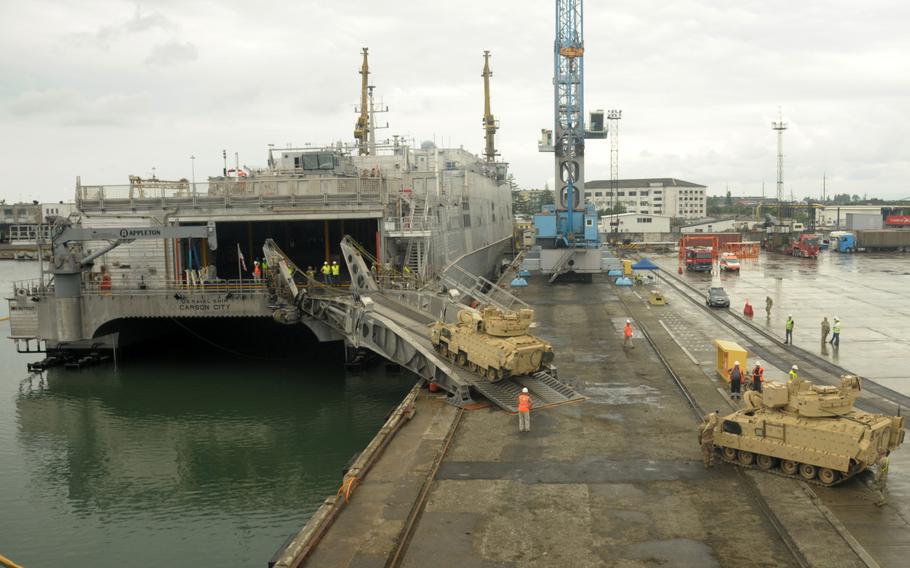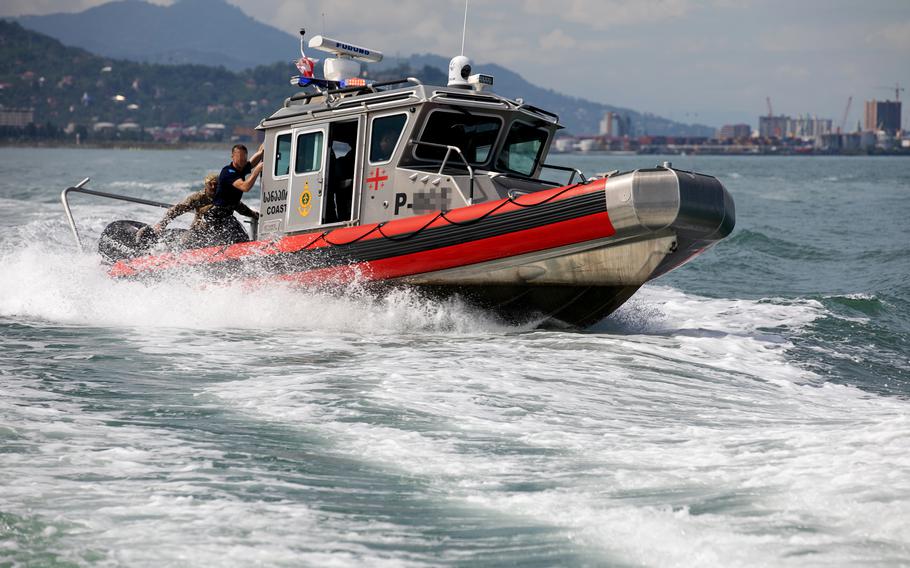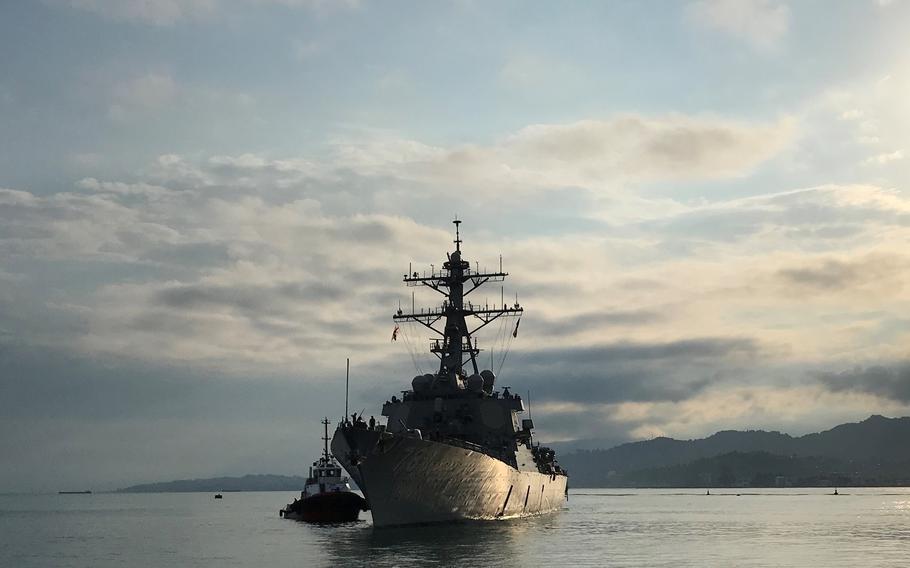
U.S. soldiers load equipment at the Georgian port of Poti in 2018. Russia is planning to build a naval base on the Black Sea coast of Georgia’s breakaway Abkhazia region, according to media reports. (Robert Jordan/U.S. Army)
News that Russia will establish a permanent naval base in Georgia’s breakaway region of Abkhazia is likely further proof that Ukraine is effectively winning the battle of the Black Sea off its coast, experts say.
On Thursday, Abkhazia’s leader, Aslan Bzhania, said his government had signed an agreement with Moscow to set up a base in the seaside Ochamchira district “in the near future.”
It’s part of wider efforts to increase the defense capabilities of both sides, Bzhania told Russian newspaper Izvestia.
The news follows repeated attacks by Ukraine on Russia’s Black Sea Fleet, based in Sevastopol on the Crimean Peninsula, which Moscow illegally annexed from Ukraine in 2014.

Georgian military members and first responders train with U.S. Special Forces in June 2023 in Batumi, Georgia. Russia is planning to build a naval base on the Black Sea coast of Georgia's breakaway Abkhazia region, according to media reports. ( Mykaela Martin/U.S. Army)
Recent satellite imagery obtained by the Institute for the Study of War indicates that Russia has been relocating some of its ships from Sevastopol to the Russia port city of Novorossiysk, near Crimea’s eastern coast.
The Washington, D.C.-based research group described the move as likely an effort to avoid further Ukrainian strikes.
Ochamchira is about 300 miles southeast of Novorossiysk on the Black Sea. Russia already has a coast guard station in the district and has discussed opening a naval base there for years.
“Moscow’s decision to enlarge a naval facility at Ochamchira may best be viewed as a Russian retreat, reflecting a realization that never again will Sevastopol be safe anchorage for Russia’s Black Sea Fleet,” said William Courtney, a former U.S. ambassador to Georgia and senior fellow at the Rand Corp.
As of Friday afternoon, the Kremlin had not commented on the base.

The destroyer USS Porter arrives at the Black Sea port in Batumi, Georgia, in 2020. The leader of the breakaway Georgian region of Abkhazia told a Russian newspaper this week that the Kremlin signed a deal to set up a naval base on the region's Black Sea coast. (U.S Navy)
If the reports are true, the Russian actions would represent “a gross violation of the sovereignty and territorial integrity of Georgia,” the country’s Foreign Affairs Ministry said in a statement Thursday.
Russia recognized Abkhazia and another breakaway region, South Ossetia, as independent states in 2008 after a five-day war with Georgia in which Russian troops supported the separatists.
Russia has kept troops in both regions since, and Georgia continues to accuse Moscow of illegally occupying them.
At a 2008 summit, NATO promised to one day allow Georgia to join the alliance. The small country sent troops to support U.S.-led coalitions in Afghanistan and Iraq and regularly hosts a military exercise for NATO members.
But the government in Tbilisi has taken an increasingly anti-Western stance in recent months, describing NATO expansion as the main cause of Russia’s war in Ukraine, refusing to supply weapons to Kyiv and refusing to sanction Moscow over the February 2022 invasion.
Russia may therefore assume that the U.S. and its allies are less likely to come to Georgia’s defense in the event of sharper Russian pressure, Courtney said.
“Georgians will now have to decide how they wish to balance relations between Russia, which threatens their country, and the West, which does not,” Courtney said.
Tbilisi’s efforts to build a more pragmatic relationship with the Kremlin are partly due to concerns that Russia could try to seize more of its territory in light of the situation in Ukraine, experts say.
While a Russian naval base in Ochamchira would likely exacerbate these fears, its regional impact would probably be limited, according to Dmitry Gorenburg, a senior research scientist at the Virginia-based Center for Naval Analyses.
“It increases Russia’s options in terms of where it can place its ships,” Gorenburg said. “But I don’t think it’s going to lead to any kind of a sea change in overall balance of power or in Russian strategy in the region.”
Despite not having a navy, Ukraine has used domestically produced drones, commando raids and long-range cruise missiles provided by Western countries to repeatedly attack Russia’s Black Sea fleet.
Last month, Ukrainian forces bombed and partially destroyed the fleet’s headquarters in the heart of Sevastopol.
“NATO will be stepping up its surveillance and ensuring that we continue to have a very clear idea of how Russian naval assets are distributed,” retired Adm. James Stavridis, a former NATO supreme allied commander in Europe, said in response to the reports about the Abkhazia base.
“And by the way, I don’t think that the Russian Black Sea fleet will be safe from Ukrainian drones even at a distance,” he added. “They can run, but they can’t hide.”